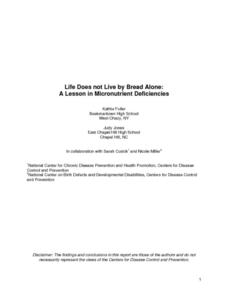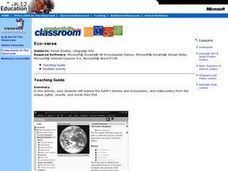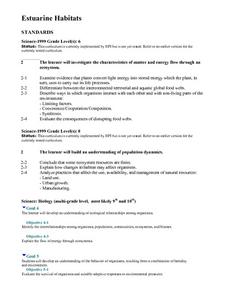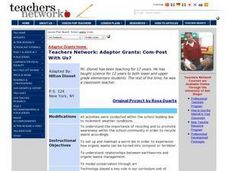Curated OER
Seas Of Life
Students brainstorm examples of predator and prey that are featured in a video they watch. In this investigative lesson students will research an animal from the video and explain if it is a predator or prey and how it helps species...
Curated OER
Life Does Not Live By Bread Alone
Students investigate the relationship between micronutrients and proper metabolic function. The instructional activity should serve as an introduction to the subject. The subject of the function includes the study of plants, animals, and...
Curated OER
Earth Day
Students participate in activities to make them aware of Earth Day and its significance, and how they can make a difference in saving the environment.
Curated OER
Sustainability
Fifth graders investigate the concept of natural resources. They participate in a simulation project to see possible uses. They use the internet to study how Hacienda Verde is used as a model for others for sustainable coffee crops.
Curated OER
Fish Parasite Survey
Learners survey and dissect as many fish as possible. They count nematodes, cestodes and crustaceans on the fish, fill out autopsy reports, and transfer data to a chalkboard data table. Students graph the results of the entire class...
Curated OER
Eco-Poetry
Students explore the Earth's various biomes and ecosystems using Internet research. They create a multimedia poem using the photos, sounds, and vocabulary from their research.
Curated OER
What's in Our Woods?
Students observe their local forest and document the change that occurs over the school year. For this forestry lesson, students utilize a GPS to mark a certain area of the woods as their study area for the remainder of the year....
Curated OER
Blue Planet: Open Ocean
Students research facts about animal species. In this ocean activity students view a video, prepare illustrated cards and create a food-web display.
Curated OER
Saving Habitat
Students pick an animal native to Maryland and research how populations of that animal might be affected by land use changes over the past thirty years. They predict population trends for the next thirty years.
Curated OER
Have Fun With Technical Report Writing
Students use Clarisworks Word Processing and Spreadsheet, Quick-Take Camera and Software, and produce a publishable technical paper.
Curated OER
Plants for Pleasure and Profit
Young scholars study about some of the specimens collected or diagrammed by Lewis and Clark, discuss their usefulness, and rank their importance. They write a persuasive essay detailing the plants they thought the most important.
Curated OER
Estuarine Habitats
Sixth graders study the important habitats, flora, fauna, and physical factors of coastal habitats. They compare the aquatic habitats to terrestrial habitats by researching and completing tables with the information.
Curated OER
Connections
Students examine the interdependence of the West Central African forest ecosystem. They draw pictures of items found in this ecosystem, discuss their interdependence, and answer discussion questions.
Curated OER
Listening to the Prairie
Learners, in groups, visit an exhibit and for a prairie scavenger hunt to locate sunflowers and name products made from them. After sketching a prairie dog, they find nature cues farmers use when growing plants and raising animals. The...
Curated OER
Com-Post With Us?
Students discuss the importance of reducing, recycling and reusing materials to help the environment. As a class, they create a worm bin and observe how it turns material in to compost. They use the internet to research the...
















